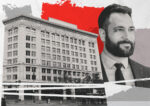San Francisco has tried for three years to convince developers to convert empty offices to homes through less red tape, zoning flexibility and a ballot measure to scrub transfer taxes.
But with only two projects in the pipeline, Mayor London Breed and Supervisor Matt Dorsey have proposed a more powerful lure: eliminating all impact fees and affordable housing requirements for Downtown conversions, the San Francisco Chronicle reported.
Their proposed legislation would save developers between $70,000 and $90,000 a unit, according to the mayor. Its goal: to draw 30,000 new residents and students to Downtown within six years. A timeline for the ordinance was not disclosed.
“San Francisco is changing to a ‘city of yes’ where we remove all the barriers and obstructions that get in the way of what’s possible,” Breed declared in a statement. “By eliminating these fees we are saying yes to change, yes to housing and yes to turning Downtown into a 24/7 neighborhood.”
The waiver would only apply to central Downtown, including the Market Street corridor, Union Square and the Financial District.
So far, efforts to entice landlords and developers to convert their office buildings have come to little, despite the number of empty offices having just surpassed 37 percent, a record.
Developers have applied for two office-to-home projects with a combined 164 units, but have yet to break ground, according to the Chronicle. They include 120 units at the Humboldt Bank building at 785 Market Street and 45 units at the Warfield Building at 988 Market Street.
Forge Development Group, behind the Humboldt Bank conversion, has financing and is prepared to pull permits. Group I, behind the Warfield Conversion, has been hit with a notice of loan default, and is still on the hunt for capital.
The proposed legislation to cut impact fees and affordable housing hurdles, plus the elimination of the transfer tax and a tax incentive bill by Assemblyman Phil Ting passed last month, could pump up the conversion pipeline, developers say.
The combined incentives are “what the doctor ordered in order to make conversions more feasible,” Jesse Blout, a founding partner with Strada Investment Group, told the Chronicle. “It can make the difference between go and no-go.”
Blout said he knows of four or five conversion deals on the table, but it’s hard to make them pencil.
“None of these buildings work perfectly; the cores are imperfect in terms of shape, elevator placement. They require a lot of rework,” he said.
Chris Foley, a seasoned developer and broker, isn’t convinced that office-to-home conversions can do much to revive Downtown San Francisco.
“At the end of the day it costs the same amount of money to do a conversion as it does to build new,” Foley told the newspaper. “It’s great (Breed) is cutting the fees, but it’s not going to move the needle.”
— Dana Bartholomew
Read more



